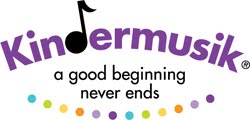One of the most important elements of the Kindermusik home materials is the literature that comes with each curriculum set. Creative and colorfully constructed, each book is merely a visual guide to the many distinct variations you will want to explore while sharing storytime with your little one. Reading to your baby in a creative, expressive manner helps your baby develop a solid emotional foundation. Exploring a variety of sounds and variations between vocal pitches exposes your baby to a stimulating environment which fosters communication and social development. This becomes evident when your baby starts to point, touch and ask questions about the book you are sharing together. Babies develop thinking skills by repetition and imitation. These are two basic components we see again and again in musical forms as well. It is only natural, therefore that we make a conscious effort to enhance and stimulate the young child's environment by the combination of these two elements. This is further enhanced when your baby starts to recognize images and mimic the rhythms of your voice. It is important to remember that you are helping to make a learning connection between the two things your baby loves the most...the sound of the mother's voice and a feeling of closeness, togetherness. When reading to baby, remember to read expressively, read beyond the words...including vocal play and time for discovery. It is a mother's treasure to hear her child's first words and feelings. Storytime provides young children with a good foundation for a healthy emotional development. Take the time... make the time to read with your baby!
Thursday, June 24, 2010
Friday, June 18, 2010
Kindermusik Concepts and Learning Theories for the Preschool Age Child
Kindermusik for the preschool-age child is a combination of three major concepts and learning theories, which are 1)Pretend play experienced through play, 2)Valuing music through the social functions of musical communities , and 3)Constructivism, a theory based on the philosophies of Piage and Vygotsky. We see these applications at work in the Kindermusik classroom with the Imagine That! curriculum as well as the Kindermusik Adventures series for this age group, Confetti Days! Part of building a successful, world-wide program is the research and feedback that stands as the ultimate foundation for learning. Each of these topics covers the broad spectrum of imagination & creativity your preschooler is experiencing right now!
Pretend play is based upon a child's real life experiences and s a bridge to the creative thinking strategies that develop language, sensory, motor and cognitive skills. Children construct their understandings of the world and themselves through play. In the Kindermusik classroom, pretend play activities are strategically integrated with the music, vocal development, storytelling, listening, movement and literacy aspects of each lesson plan.
Valuing music is best described through the words of Douglas R. Bartholomeww, "Music provides ambiances for times alone and with others. It can tap into our deepest emotions and extend our range of feelings. No words are needed to experience these feelings and sensations that can lead us to ponder mysteries and wonders, both great and small." The musical experiences in the Kindermusik classroom provide connections between people, identify people within a social framework, and coordinate social function. Through these connections, music fosters a sense of community among groups of people.
Constructivisn in the classroom is based on the philosphies of Lev Vygotsky (1896-1934), a Russian educator and psychologist and Jean Piaget (1896-1980), a Swiss reseracher and scholar in psychology and sociology. According to Vygotsky, a child constructs his own understanding of the world through social interaction and experience with others. Vygotsky stressed the adult's role in assisting children with collaborative learning and the use of language as a critical tool in this process. Piaget's study of children and cognitive development has greatly influenced education theory and practice. According to Piaget, a child's understanding of the world results from his interaction with the physical and social environment. The application of this theory results in the Kindermusik setting which is rich with opportunities to explore, experiment, create & have fun within a supportive network of family and friends.
Pretend play is based upon a child's real life experiences and s a bridge to the creative thinking strategies that develop language, sensory, motor and cognitive skills. Children construct their understandings of the world and themselves through play. In the Kindermusik classroom, pretend play activities are strategically integrated with the music, vocal development, storytelling, listening, movement and literacy aspects of each lesson plan.
Valuing music is best described through the words of Douglas R. Bartholomeww, "Music provides ambiances for times alone and with others. It can tap into our deepest emotions and extend our range of feelings. No words are needed to experience these feelings and sensations that can lead us to ponder mysteries and wonders, both great and small." The musical experiences in the Kindermusik classroom provide connections between people, identify people within a social framework, and coordinate social function. Through these connections, music fosters a sense of community among groups of people.
Constructivisn in the classroom is based on the philosphies of Lev Vygotsky (1896-1934), a Russian educator and psychologist and Jean Piaget (1896-1980), a Swiss reseracher and scholar in psychology and sociology. According to Vygotsky, a child constructs his own understanding of the world through social interaction and experience with others. Vygotsky stressed the adult's role in assisting children with collaborative learning and the use of language as a critical tool in this process. Piaget's study of children and cognitive development has greatly influenced education theory and practice. According to Piaget, a child's understanding of the world results from his interaction with the physical and social environment. The application of this theory results in the Kindermusik setting which is rich with opportunities to explore, experiment, create & have fun within a supportive network of family and friends.
Subscribe to:
Posts (Atom)
